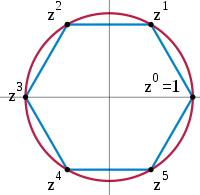Non-abelian group
| Algebraic structure → Group theory Group theory |
|---|
 |
|
Modular groups
|
Infinite dimensional Lie group
|
In mathematics, and specifically in group theory, a nonabelian group, sometimes called a noncommutative group, is a group ( G, ∗ ) in which there exists at least one pair of elements a and b of G, such that a ∗ b ≠ b ∗ a.[1][2] This class of groups contrasts with the abelian groups. (In an abelian group, all pairs of group elements commute).
Nonabelian groups are pervasive in mathematics and physics. One of the simplest examples of a nonabelian group is the dihedral group of order 6. It is the smallest finite nonabelian group. A common example from physics is the rotation group SO(3) in three dimensions (rotating something 90 degrees away from you and then 90 degrees to the left is not the same as doing them the other way round).
Both discrete groups and continuous groups may be nonabelian. Most of the interesting Lie groups are nonabelian, and these play an important role in gauge theory.
See also
References
- ↑ Dummit, David S.; Foote, Richard M. (2004). Abstract Algebra (3rd ed.). John Wiley & Sons. ISBN 0-471-43334-9.
- ↑ Lang, Serge (2002). Algebra. Graduate Texts in Mathematics. Springer. ISBN 0-387-95385-X.